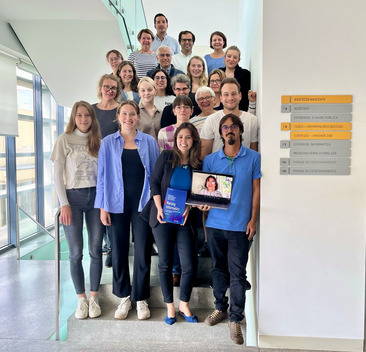eHealth4all@EU
News
Access to the online courses
The project ended on 31.12.2022.
It is possible to get access for the following online courses:
- Learning Healthcare in Action: Clinical Data Analytics
- Learning Healthcare in Action: Data Protection and Security
- Interoperability in Healthcare
If you would like access to one of the courses, please send an email to: n.egbert@hs-osnabrueck.de
We will then provide you with the credentials.
2022
From September 8 to 13, 2022, the ERASMUS+ Summer School eHealth4all@eu took place at the University of Porto in Portugal. The event, designed as an interprofessional course, was organized by the partners of the eHealth4all@eu project: the University of Eastern Finland, the University of Porto, the University of Osnabrück under the leadership of the Osnabrück University of Applied Sciences (Prof. Dr. Ursula Hübner). Participants were PhD and Master students from the three countries working in the areas of
- Interoperability of data and systems
- data protection and data security as well as
- data analytics and decision support systems.
decision support systems.
Summer School participants were provided with online videos and self-study materials to prepare in advance. In the on-site courses, mini-lectures and group work took place according to the scheme of problem-based learning. Each module was concluded by a student presentation.
The event, which was organized as a Summer School, will be continued. Next year it will be held as a Spring School at Osnabrück University of Applied Sciences and the following year as a Winter School at the University of Eastern Finland in Kuopio.
2021
The course Learning Healthcare in Action: Clinical Data Analytics started with a two-day kick-off on June 17th and 18th, 2021. 17 students and doctoral candidates from Germany, Finland, Portugal and the USA are taking part in the online course, which will run until August 25th. The second course on Data Protection & Security will then start in September. Further information will follow soon.


This workshop was organised and presented by
Ursula Hübner and Nicole Egbert from the University of Applied Sciences Osnabrück, Germany
Kaija Saranto and Ulla-Mari Kinnunen from the University of Eastern Finland, Kuopio, Finland and
Pedro Marques from the University of Porto, Portugal.
Building on existing health informatics educational recommendations (IMIA, TIGER etc.) this workshop presented results of the ERASMUS project eHealth4all@eu that focused on the verification of these recommendations. A verification performed through the lens of experts from the field, such as physicians, nurses, physiotherapists, managers and informaticians, is necessary to adjust the recommendations that were mainly developed in the academic arena. However, it is the healthcare workforce that is confronted with the digital tools and needs to be trained and upskilled regarding health informatics.
The developments are embedded in the rich tradition of EFMI’s and IMIA’s activities in the educational area which was presented by John Mantas from the University of Athens.
eHealth4all@eu, which aims to develop, implement and evaluate interprofessional courses for graduate students from all different health professions, utilizes an educational pipeline for the course development. This pipeline starts with recommendations rooted in the TIGER initiative (Technology Informatics Guiding Education Reform), updates these recommendations through a scoping review of relevant educational publications, verifies these findings in focus group interviews before defining the pedagogical methods, the learning platform and the syllabus.
This workshop concentrated on the finding from the focus group discussions that were conducted in the three partner countries, i.e. Finland (findings presented by Ulla-Mari Kinnunen), Germany (findings presented by Nicole Egbert) and Portugal (findings presented by Pedro Marques). The findings were presented and summarized by Kaija Saranto.
The findings showed that the initial plans of the consortium to develop, implement and evaluated courses in the fields of
- data protection and security,
- interoperability,
- data analytics,
- innovation and entrepreneurship,
- leadership and governance and finally
- ethical and legal issues
met the requirements of the experts from the field. Some topics, e.g. data analytics, were highlighted only in one or two countries revealing some country specific views.
There was an interesting discussion, which was moderated by Ursula Hübner und Kaija Saranto, about the need to include health informatics ethics in the curricula of health professionals due to the upcoming AI based solutions and the steadily increasing digital outreach to patients. Both fields raised ethical questions that go beyond the classic biomedical ethics discourse. Furthermore, the question was raised how to increase the medical and health informatics workload in the curricula of physicians and nurses that are already crowded.
As the workshop lasted only 60 minutes, 15 minutes for the discussion were not enough to share all opinions and viewpoints. The discussion also revealed that there is a great interest in educational topics which matches the current IMIA activities to update its educational recommendations in biomedical and health informatics.



2020
The first results of the project were presented at the EFMI 2020 Special Topic Conference, that was held as an electronic conference in November the 26th - 27th, 2020. As part of this conference, we held a workshop entitled "TIGER goes ERASMUS: Implementing Problem Based Inter-Professional Health Informatics Education".
The following topics were presented from our project team:
- eHealth4all@EU Project Overview (Ursula Hübner, Osnabrück University of Applied Sciences)
- Overview of health informatics education (Ulla-Mari Kinnunen, University of Eastern Finland)
- Online health informatics problem based learning (Nicole Egbert, Osnabrück University of Applied Sciences)
- Overview learning platforms and tools (Pedro Marques & Ricardo Correia, University of Porto)

On 30.01.2020 the kick-off meeting took place in winterly Kuopio (Finland).




